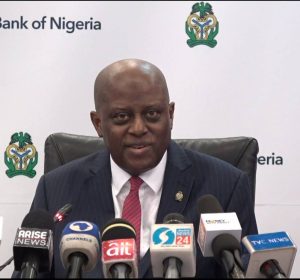
Monetary Policy Committee Set to Announce Interest Rate Hike Amidst Inflation and Survival Concerns
Nigeria’s Monetary Policy Committee (MPC) is set to announce another interest rate hike as the country grapples with high inflation and economic hardship. The MPC meeting, which commenced on Monday, is expected to yield a decision that will impact the economy.
The inflation rate, which stands at 33.88%, is only 0.3 percentage points behind its three-decade high. The month-on-month Consumer Price Index (CPI) growth last month was the highest since March, indicating a spike in the intensity of the inflation movement pattern.
Experts have warned that another interest rate hike could worsen the economic situation, leading to business closures, rising unemployment, and reduced overall welfare. Dr. Yunana Bature, an economic expert, advised the MPC to hold the rate, while the fiscal authorities should minimize spending and prioritize import substitutions.
Another expert, Kevin Emmanuel, predicted that the MPC would increase the rate by about 50 basis points due to the recent devaluation of the naira and the increment in the pump price. However, he noted that more than 50 basis points would not have any positive impact on the economy.
The Central Bank of Nigeria (CBN) has raised the Monetary Policy Rate (MPR) by 850 basis points since February, with the aim of addressing high inflation. However, experts have argued that the strategy has not yielded the desired results, and that the CBN needs to adopt a more balanced approach that stabilizes the naira, addresses structural inflation drivers, and supports economic growth.
Another expert, Dr Chijioke Ekechukwu has said It is not advisable for the Monetary Policy Committee (MPC) of the Central Bank of Nigeria (CBN) to further tighten the Monetary Policy Rate (MPR).
Ekechukwu, a former president of the Abuja Chamber of Commerce and Industry, spoke against the backdrop of the 298th MPC meeting scheduled for Monday and Tuesday.
Speaking in an interview on Monday in Abuja likened the situation to an ailment that needed two medications to cure.
“If a patient continues to use one medication and even increases its dosage without adding the second medication, that patient will never get well.
“Monetary policy continuous tightening will on its own not solve the inflationary problem of the country.
This is because other factors have a stronger impact in determination of inflation rate,” he said.
According to him, further increase of MPR will continue to stifle the financial system, increasing cost of borrowing.
He said that the situation would in turn be passed over to ultimate consumers, who are already struggling to earn a living in an economy already riddled with hardship.
“I, therefore, do not expect any further tightening of the monetary policy,” he said.
MPC raised the MPR, which is the baseline interest rate by 50 basis points to 27.25 per cent from 26.75 per cent in its 297th meeting in September.
That decision marked the fifth consecutive tightening of the rate since Yemi Cardoso took charge as CBN governor and chairman of the MPC.
“The first decision under Cardoso was an aggressive hike in the MPR by 400 basis points from 18.75 per cent to 22.75 per cent in February.
In March, the committee, again, increased the MPR by 200 basis points to 24.75 per cent, followed by subsequent hikes to 26.25 in May, and 26.75 per cent in July.
Cardoso has, thus, raised the MPR by 850 basis points since the commencement of his tenure.
The aim, according to him, is to aggressively address Nigeria’s high inflation, particularly core and food inflation.
Analysis:
The impending interest rate hike by the MPC has sparked concerns among experts, who warn that it could exacerbate the economic situation. The inflation rate, which is already high, could be further fueled by the hike, leading to reduced purchasing power and increased poverty.
The CBN’s strategy of raising the MPR to combat inflation has not yielded the desired results, and experts argue that a more balanced approach is needed. The bank needs to consider the broader economic impacts of its decisions and adopt a more nuanced approach that addresses the root causes of inflation.
The government also needs to play its part by minimizing spending, prioritizing import substitutions, and implementing structural reforms to address the supply-side drivers of inflation. A coordinated approach is necessary to address the economic challenges facing Nigeria.

